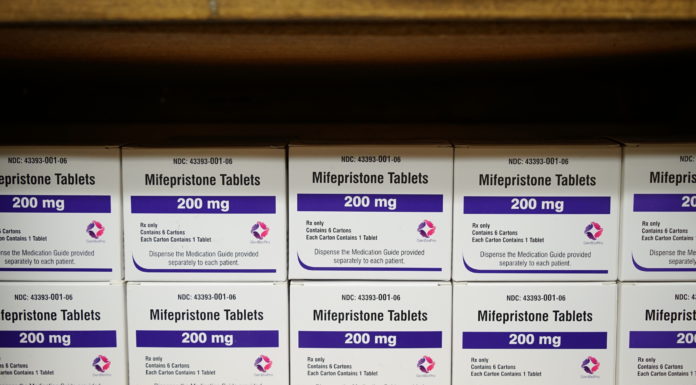(Headline USA) The Supreme Court on Thursday unanimously preserved access to a pharmaceutical that was used in nearly two-thirds of all abortions in the U.S. last year, in the court’s first abortion decision since conservative justices overturned Roe v. Wade two years ago.
While a victory on paper for abortion advocates, the ruling is likely to take considerable steam from one of the top wedge issues that Democrats had hoped to use to motivate their base in the coming November election, affirming that so-called abortion access is not under attack at the federal level, as the Left claims it to be.
It may also buy some relief for Justices Samuel Alito and Clarence Thomas, who have been personally targeted for attack by activists waging a smear campaign to discredit the court’s two most conservative jurists and some of its oldest.
The justices ruled that plaintiffs seeking to ban the drug lacked the legal right to sue over the federal Food and Drug Administration’s approval of the medication, mifepristone, and the FDA’s subsequent actions to ease access to it.
The case had threatened to restrict access to mifepristone across the country, including in states where abortion remains legal.
Justice Brett Kavanaugh wrote for the court that “federal courts are the wrong forum for addressing the plaintiffs’ concerns about FDA’s actions.”
Kavanaugh was part of the majority to overturn Roe in Dobbs v. Jackson Women’s Health—a ruling that focused not on the legality of abortion per se, but on the fact that the Roe-era court had overstepped its authority by legislating from the bench.
The decision not to get involved in yet another case that would require it to regulate the issue thus seems consistent with the reasoning they applied, and likely preserves the legislation from states like Texas and Louisiana that have acted to restrict access to the pills.
A recent law passed in Louisiana cited cases—including a high profile one involving the sister of the bill’s sponsor—in which pregnant women had been secretly poisoned using the abortion drug by others hoping to force them to involuntarily and unwittingly kill the preborn infant.
It may be impossible to know how many such cases succeed in the U.S. without the mother’s knowledge, since only those that are discovered and prosecuted ultimately become part of the public record.
However, the drug’s proponents argue that the harm caused in limiting its availability to mothers who are forced against their will to carry out an unwanted pregnancy would be far greater.
More than 6 million people have used mifepristone since 2000. The drug blocks the hormone progesterone and primes the uterus to respond to the contraction-causing effect of a second drug, misoprostol. The two-drug regimen has been approved to abort babies through 10 weeks gestation.
Health care providers have said that if mifepristone is no longer available or is too hard to obtain, they would switch to using only misoprostol, which is somewhat less effective in ending pregnancies.
President Joe Biden’s administration and drug manufacturers had warned that siding with abortion opponents in this case could undermine the FDA’s drug approval process beyond the abortion context by inviting judges to second-guess the agency’s scientific judgments.
The Democratic administration and New York-based Danco Laboratories, which makes mifepristone, argued that the drug is among the safest the FDA has ever approved.
The decision “safeguards access to a drug that has decades of safe and effective use,” Danco spokeswoman Abigail Long said in a statement.
The abortion opponents argued in court papers that the FDA’s decisions in 2016 and 2021 to relax restrictions on getting the drug were unreasonable and “jeopardize women’s health across the nation.”
Kavanaugh acknowledged what he described as the opponents’ “sincere legal, moral, ideological, and policy objections to elective abortion and to FDA’s relaxed regulation of mifepristone.”
But he said they went to the wrong forum and should instead direct their energies to persuading lawmakers and regulators to make changes.
Former President Donald Trump, the presumptive Republican presidential nominee, has publicly stated that he would push to keep abortion decisions where they currently are, at the state level, if reelected.
The mifepristone case began five months after the Supreme Court overturned Roe. Abortion opponents initially won a sweeping ruling nearly a year ago from U.S. District Judge Matthew Kacsmaryk, a Trump nominee in Texas, which would have revoked the drug’s approval entirely.
The 5th U.S. Circuit Court of Appeals left intact the FDA’s initial approval of mifepristone. But it would reverse changes regulators made in 2016 and 2021 that eased some conditions for administering the drug.
The Supreme Court put the appeals court’s modified ruling on hold, then agreed to hear the case, though Alito and Thomas would have allowed some restrictions to take effect while the case proceeded.
The high court is separately considering another abortion case, about whether a federal law on emergency treatment at hospitals overrides state abortion bans in rare emergency cases in which a pregnant patient’s health is at serious risk.
Adapted from reporting by the Associated Press

